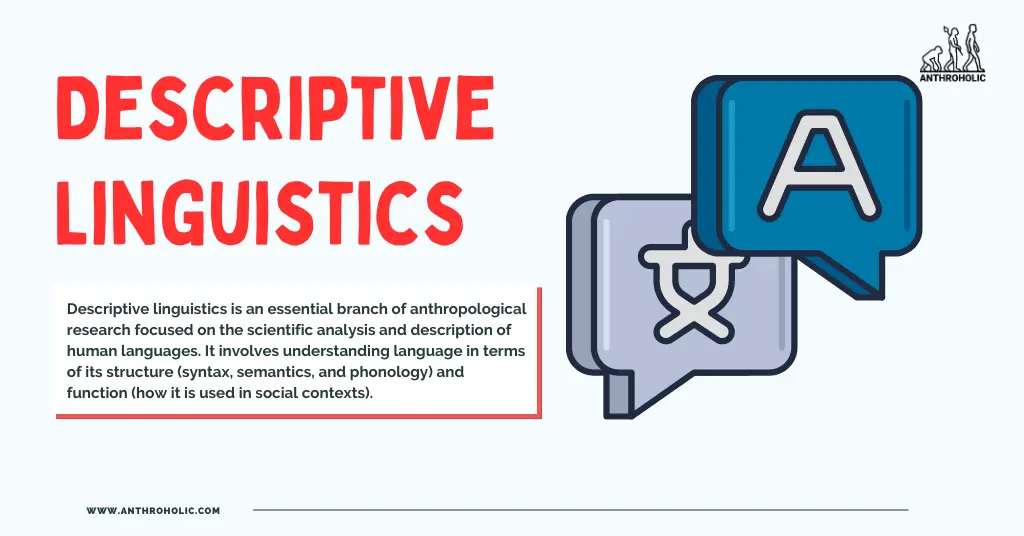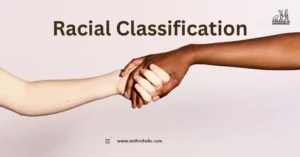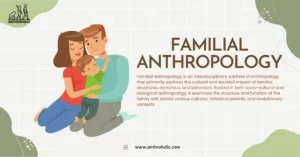AI Answer Evaluation Platform Live Now. Try Free Answer Evaluation Now
Descriptive Linguistics
Descriptive linguistics is an essential branch of anthropological research focused on the scientific analysis and description of human languages. It involves understanding language in terms of its structure (syntax, semantics, and phonology) and function (how it is used in social contexts) [1].

Understanding the Core of Descriptive Linguistics
In descriptive linguistics, language is not merely a system of communication; it is a social phenomenon with deep ties to cultural and societal norms. Here, the central concepts that form the backbone of this discipline include:
- Language Structure: Examines the principles behind language arrangement, encompassing syntax (sentence structure), semantics (meaning), phonology (sound), and morphology (word structure).
- Language Function: Studies how language is used in various social contexts and the relationship between language and culture.
- Language Variation: Understands how language differs based on geographical location, social groups, and individual identities.
- Language Change: Studies the evolution of languages over time, considering factors like contact with other languages and social changes [2].
Key Techniques and Methods in Descriptive Linguistics
Descriptive linguistics employs a variety of techniques to study language in depth, such as:
Ethnography of Communication:
A research method that focuses on how members of a particular community use language to express their social roles and cultural norms. This approach was pioneered by Dell Hymes, who argued that to understand a language fully, one must consider its use in its cultural context [3].
Participatory Observation:
Linguistic anthropologists often immerse themselves in the culture they are studying, observing and participating in day-to-day conversations to gather insights.
Recording and Transcription:
This involves capturing spoken language and transcribing it for analysis. This technique helps understand the nuances of pronunciation, accent, and dialect.
Linguistic Surveys:
Used to gather data on the variations and distribution of languages or dialects in a particular region.
Corpora Analysis:
Using a large body of text or spoken material in digital form (corpora), linguists apply various computational techniques to study patterns and trends [4].
Descriptive Linguistics in Practice
Descriptive linguistics is more than just a theoretical field. It is extensively applied in several domains:
Language Preservation and Revitalization:
In an era of increasing globalization, many languages are in danger of disappearing. Linguistic anthropologists document endangered languages, creating grammars, dictionaries, and teaching materials to aid in language preservation and revitalization.
Translation and Interpretation:
Understanding the structure and usage of different languages assists in more accurate and culturally sensitive translation and interpretation.
Forensic Linguistics:
Descriptive linguistics can aid in solving crimes by analyzing the linguistic features of written or spoken evidence.
Language Planning and Policy:
Knowledge of how languages function and vary can guide the development of language policies and educational programs.
Role of Descriptive Linguistics in Anthropological Research
Descriptive linguistics plays a vital role in anthropological research, particularly in the following areas:
- Cultural Anthropology: Understanding the way language is used in different cultures can provide insights into societal norms and cultural practices.
- Archaeology: By studying the linguistic evolution, archaeologists can infer migration patterns and cultural exchanges between ancient civilizations.
- Social Anthropology: Language variation and change can reflect social structures, hierarchies, and power dynamics.
- Cognitive Anthropology: Investigates how language influences thought processes and cognitive functions.
| Anthropology Branch | Role of Descriptive Linguistics |
|---|---|
| Cultural Anthropology | Provides insights into societal norms and cultural practices |
| Archaeology | Infers migration patterns and cultural exchanges |
| Social Anthropology | Reflects social structures and power dynamics |
| Cognitive Anthropology | Studies influence of language on cognitive functions |
Challenges in Descriptive Linguistics
Despite the importance and broad applicability of descriptive linguistics, it’s not without challenges:
- Data Collection: Gathering language data can be challenging due to issues like geographical remoteness, community resistance, or language endangerment.
- Subjectivity: Since language is deeply entwined with cultural and social identity, research can be influenced by personal biases and preconceptions.
- Linguistic Diversity: The sheer number and diversity of human languages can make comprehensive studies daunting.
The Future of Descriptive Linguistics
As our world continues to evolve, so does the field of descriptive linguistics. Technological advancements are making data collection and analysis more accessible, and the recognition of language’s role in cultural preservation is growing. We can look forward to ongoing contributions from this field, enhancing our understanding of human culture and communication.
Conclusion
Descriptive linguistics is an essential pillar of anthropological research. It serves as a mirror reflecting society’s norms, values, and belief systems embedded within language use and structure. By understanding languages, we are better equipped to comprehend the intricate human behaviors and social dynamics in different cultures.
| Challenges in Descriptive Linguistics | Possible Solutions |
|---|---|
| Difficulty in data collection | Technological advancements in data collection |
| Subjectivity in interpretation | Strict methodological guidelines and researcher reflexivity |
| Linguistic diversity | Collaboration across interdisciplinary teams |
Suggested Articles
References
[1] Duranti, A. (1997). Linguistic Anthropology. Cambridge University Press. https://www.academia.edu/6505213/Linguistic_Anthropology_Duranti
[2] Crystal, D. (1997). The Cambridge Encyclopedia of Language. Cambridge University Press. https://doi.org/10.4000/lexis.4512
[3] Hymes, D. (1974). Foundations in Sociolinguistics: An Ethnographic Approach. University of Pennsylvania Press. https://doi.org/10.4324/9781315888835
[4] McEnery, T., & Hardie, A. (2012). Corpus Linguistics: Method, Theory and Practice. Cambridge University Press. http://dx.doi.org/10.1017/CBO9780511981395




